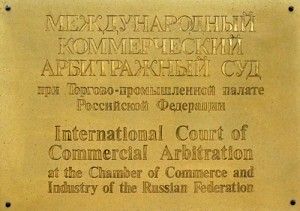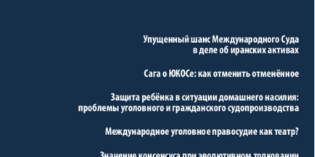New rules of the ICAC at the Russian Chamber of Commerce: what has changed for international disputes?
 Russian arbitration legislation reform has triggered a large-scale revision of regulations of arbitral institutions. One of the oldest arbitral institutions in Russia, the International Commercial Arbitration Court at the Russian Chamber of Commerce and Industry (the “ICAC”), has adopted new regulations and rules, including new rules on resolving international commercial disputes. Previous rules came into effect in 2005 (amended in 2010 and 2013).
Russian arbitration legislation reform has triggered a large-scale revision of regulations of arbitral institutions. One of the oldest arbitral institutions in Russia, the International Commercial Arbitration Court at the Russian Chamber of Commerce and Industry (the “ICAC”), has adopted new regulations and rules, including new rules on resolving international commercial disputes. Previous rules came into effect in 2005 (amended in 2010 and 2013).
To begin with, the ICAC shall now possess competence to consider a broad range of disputes, including those both international and completely domestic. It has adopted separate sets of rules for international commercial, domestic, sport-related and corporate disputes. Apart from that, it has issued new rules for administering ad hoc arbitrations. This post summarises some of the most important new provisions of the ICAC set of rules for international commercial disputes (the “Rules”) which have become effective from 27 January 2017 after deposition at the Russian Ministry of Justice.
Enhancing procedural efficiency: joinder and consolidation
A number of new provisions aim to improve procedural efficiency. In particular, previously a claimant may have consolidated several demands in a single claim only relying on a single arbitration agreement referring the dispute to the ICAC with a scope covering all such demands. Otherwise the claimant had to commence several arbitral proceedings instead of one. Now a claimant may include numerous demands in one claim even if some of them fall within the scope of several arbitration agreements rather than a single arbitration agreement. Such arbitration agreements need to be mutually compatible and interrelated from a substantive law viewpoint (ie have substantive connection).
Furthermore, upon a party’s request the ICAC Presidium may consolidate arbitral proceedings already started if mutually compatible and substantively interrelated arbitration agreements cover all the claims. However, after composition of the arbitral tribunal in second and any subsequent cases consolidation becomes possible only upon consent of all the parties. Under new rules after arbitral proceedings commence a party may file a claim against an “additional party” (ie join a co-respondent) if the scope of the arbitration agreement underlying the initial claim extends to the claim filed against such additional party. Such possibility also exists where the claim against the additional party falls within another arbitration agreement referring the respective dispute to the ICAC and is compatible with the first arbitration agreement provided such claim has substantive connection with the initial claim. The joined party may file a counter-claim or request a set-off. In consideration of procedural efficiency, the arbitral tribunal may disallow the filing of a claim against (or by) an additional party.
Composition of arbitral tribunal
The parties’ right to appoint arbitrators remains unhindered. At the same time, in line with current Russian arbitration legislation the ICAC has instituted a new body – a Committee for appointment of the arbitral tribunal (the “Committee”) – which will now appoint the arbitrators instead of the ICAC Presidium. Such Committee consists of persons appearing on the list of arbitrators recommended to hear international commercial disputes at the ICAC. The Committee members are elected by the general meeting of arbitrators included in such list. The Committee must be partly replaced every two years. A party may appoint an arbitrator both from a list of recommended arbitrators approved by the ICAC and from outside such list. By contrast, the Committee appoints arbitrators only from within the list of recommended arbitrators approved by the ICAC. However, in urgent cases the Committee may refer appointment of an arbitrator to the ICAC Chairperson or his/her respective deputy.
Disciplining the parties’ representatives
The ICAC Rules for international disputes provide that the parties’ representatives must follow all the ICAC regulations and comply with all the directions of all its bodies and authorised persons and the arbitral tribunal. If the parties’ representatives fail to do so, the authorised persons of the ICAC or the arbitral tribunal may adopt appropriate measures. In particular, the arbitral tribunal can take such counter-productive conduct of the party representative into consideration while deciding on the allocation of arbitration expenses between the parties; make a warning; or request the respective party to choose another representative. After composition of the arbitral tribunal a party may replace its representative only provided such replacement does not create a ground to challenge an arbitrator or to annul/refuse enforcement of the arbitral award.
Hearings
The ICAC now needs to notify the parties about the hearing so that each of them receives the notice at least 20 days before the hearing. Under previous Rules such term consisted of 30 days. Previously it was necessary to draw up minutes of each arbitration hearing. Now the arbitral tribunal may decide whether to take minutes of a particular hearing. After the hearing the arbitral tribunal may request the parties to make additional submissions, to present more evidence or other documents on limited issues such as the arbitration expenses borne by the party.
Expedited arbitral proceedings
The Rules provide for consideration of disputes not exceeding US$50,000 normally by a sole arbitrator in an expedited manner. Under such expedited procedure the arbitrator must normally render the award within 120 days of her or his appointment (in contrast, in ordinary ICAC proceedings such time limit constitutes 180 days). The parties have only one “round” of submissions unless the arbitrator or, before his/her appointment, the ICAC executive secretary, decides otherwise. The arbitrator resolves the case based on written materials only, unless the arbitrator decides to conduct an oral hearing or a party requests him or her to do so in timely fashion. Even if a party subsequently increases the amount of claim so that it exceeds US$50,000, the expedited arbitral proceedings may continue.
Rendering and publication of arbitral awards
As a general rule, the majority of arbitrators render the arbitral award. The parties may now derogate from such general rule by their agreement. For instance, the parties may decide that the award must be rendered by arbitrators unanimously. The Rules provide that if it becomes impossible for the arbitrators to render an award (a case of deadlock), the award shall be rendered by the chairperson of the arbitral tribunal. The Rules now expressly provide that it is possible to publish the arbitral awards or orders of the arbitral tribunal if agreed so by the ICAC Presidium provided the parties’ names and other identifying information which may become detrimental for the parties are deleted.
Summary
In general, the ICAC preserved the continuity of its rules for international disputes while refraining from revolutionary changes. At the same time, the ICAC substantially modernised its rules with due regard to the needs of international commerce, current Russian legislation and its own past practice of resolving disputes. The amendments in its rules also correspond to the trends followed by major international arbitral institutions.
The ICAC has published the new rules and regulations on its website (in Russian).















1 Comment on "New rules of the ICAC at the Russian Chamber of Commerce: what has changed for international disputes?"
Trackback | Comments RSS Feed
Inbound Links